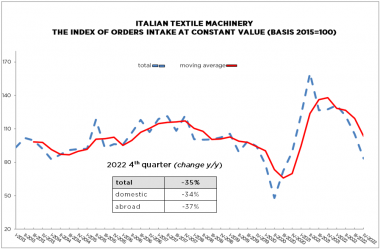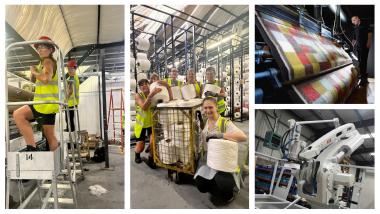Rieter AG closes financial year 2022 with record sales
- Sales of CHF 1 510.9 million,
- Order intake of CHF 1 157.3 million in 2022; order backlog of around CHF 1 540 million as of December 31, 2022
- EBIT margin of 2.1%
- Implementation of action plan to increase profitability ongoing
- Dividend of CHF 1.50 per share proposed
With record sales of CHF 1 510.9 million, Rieter achieved an increase of 56% compared with the previous year (2021: CHF 969.2 million). In the second half of 2022, especially in the fourth quarter, the measures introduced to address material bottlenecks had a positive impact. Consequently, sales increased to CHF 890.3 million compared with the first six months (first half-year 2022: CHF 620.6 million).
Order intake was CHF 1 157.3 million in 2022 (2021: CHF 2 225.7 million) and thus remained at a high level thanks to the company’s technological lead and broad international presence. The market situation, especially in the second half of 2022, was characterized by investment restraint and below-average capacity utilization at spinning mills due to geopolitical uncertainties, rising financing costs, and consumer reticence in important markets.
The company had an order backlog of around CHF 1 540 million at the end of 2022, which thus extends into 2023 and 2024.
The profit at the EBIT level in the 2022 financial year was CHF 32.2 million (2021: CHF 47.6 million). The result was strongly influenced by substantial cost increases, which could only be offset in part through price increases or other remedial measures. In addition, to compensate for material shortages, expenses were incurred in connection with the development of alternative solutions, and in relation to the acquired businesses.
Completion of the Acquisition
Rieter consolidated the acquired automatic winding machine business with effect from April 1, 2022. This acquisition completes Rieter’s system offering in the largest market segment of ring and compact spinning, thus significantly strengthening the company’s market position.
Action Plan to Increase Profitability
Implementation of the action plan to increase profitability is ongoing. With regard to the margins for the order backlog, which remains high, the already implemented price increases in combination with a positive trend in costs, particularly in logistics, are having a favorable impact. In addition, progress was made in eliminating material bottlenecks and reducing expenses for the three acquired businesses.
Dividend
The Board of Directors proposes to the shareholders the distribution of a dividend of CHF 1.50 per share for 2022. This corresponds to a payout ratio of 56%.
Outlook
For the coming months, Rieter expects below-average demand for new equipment at first, with a revival expected in the second half of 2023 after ITMA, the leading trade fair in Milan (Italy). Rieter also believes that demand for consumables, wear & tear and spare parts will recover during 2023.
For the 2023 financial year, due to the high order backlog, Rieter anticipates sales in the order of magnitude of the previous year.
The realization of sales from the order backlog continues to be associated with risks in connection with the ongoing geopolitical uncertainties, rising financing costs, continuing bottlenecks in the supply chains, and possible, currently unforeseeable consequences of the earthquake in Türkiye in February 2023. Despite the price increases already implemented, further global cost increases continue to pose a risk to the growth of profitability. Rieter will specify the outlook in the 2023 semi-annual report.
Rieter Holding AG
















